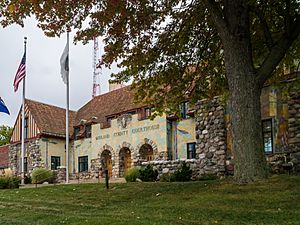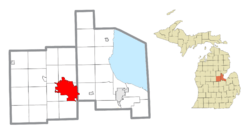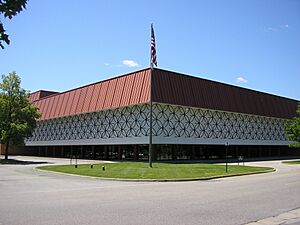Midland, Michigan facts for kids
Quick facts for kids
Midland, Michigan
|
||
|---|---|---|

Midland County Courthouse in Midland
|
||
|
||

Location within Bay County (right) and Midland County (left)
|
||
| Country | United States | |
| State | Michigan | |
| Counties | Midland; Bay | |
| Incorporated | 1887 | |
| Government | ||
| • Type | Council–manager | |
| Area | ||
| • City | 36.34 sq mi (94.12 km2) | |
| • Land | 34.37 sq mi (89.02 km2) | |
| • Water | 1.97 sq mi (5.11 km2) | |
| • Urban | 30.69 sq mi (79.48 km2) | |
| Elevation | 636 ft (212 m) | |
| Population
(2020)
|
||
| • City | 42,547 | |
| • Density | 1,237.91/sq mi (477.96/km2) | |
| • Urban | 49,387 | |
| • Metro | 82,874 | |
| Time zone | UTC-5 (Eastern (EST)) | |
| • Summer (DST) | UTC-4 (EDT) | |
| ZIP Codes |
48623 (Freeland)
48640–48642, 48667, 48670, 48674, 48686 |
|
| Area code(s) | 989 | |
| FIPS code | 26-53780 | |
| GNIS feature ID | 0632282 | |
Midland is a city in Michigan, United States. It is the main city of Midland County, Michigan. In 2020, about 42,547 people lived there. Midland is a key city in a larger area that includes Saginaw and Bay City. It is next to Midland Township, but they are run separately.
Midland is found where the Chippewa and Tittabawassee rivers meet in central Michigan. The city is home to the main office of Dow Chemical Company. This company is one of the biggest chemical makers in the world. It was started in Midland by Herbert Henry Dow in 1897. Midland also has the Midland Center for the Arts and Northwood University.
Contents
History of Midland
Early Days and Fur Trading
By the late 1820s, Midland was a place where people traded furs. It was part of the American Fur Company. Agents bought furs from Ojibwe trappers. The Campau family from Detroit also had their own trading post here around that time.
The Dow Chemical Company
Dow Chemical Company was started in Midland in 1897. Its world headquarters are still there today. Because Dow Chemical opened a plant in Handa, Japan, Midland and Handa became sister cities. Dow Corning also had its main office in Midland.
City Growth and Water Policy
In 1969, Midland created a special area around its city limits. This was called the Midland Urban Growth Area (MUGA). The city wanted to control how much the area grew. Midland was the only place that could provide drinking water to nearby communities. The city would not give water to areas within the MUGA unless they joined the city. This helped Midland manage most of the growth in the county.
Since 1991, this policy has changed. Now, Midland can sell water to nearby townships without them having to join the city.
Major Flood in 2020
On May 19, 2020, two dams, the Sanford Dam and Edenville Dam, broke. This caused about 10,000 Midland residents to leave their homes. The governor of Michigan, Gretchen Whitmer, declared a state of emergency. She warned that parts of Midland and Sanford could be under nine feet of water. She told people to stay with family or go to emergency shelters. This big flood happened just months after the COVID-19 stay-at-home order began.
Geography and Climate
Where is Midland Located?
Midland is mostly in eastern Midland County. A small part of the city reaches into Bay County. Most of the city's land used to be part of Midland Township. Midland is about 24 miles northwest of Saginaw. It is also 19 miles west of Bay City. It is part of the larger Flint/Tri-Cities area.
The U.S. Census Bureau says the city covers about 36.3 square miles. About 34.4 square miles are land, and 2.0 square miles are water. The city is along the Tittabawassee River. This river flows southeast into the Saginaw River, which then leads to Saginaw Bay in Lake Huron.
Midland's Climate
Midland has a humid continental climate. This means it has hot, rainy summers with cool nights. Winters are cold and snowy, with average high temperatures around freezing.
Population and People
| Historical population | |||
|---|---|---|---|
| Census | Pop. | %± | |
| 1870 | 1,160 | — | |
| 1880 | 1,529 | 31.8% | |
| 1890 | 2,277 | 48.9% | |
| 1900 | 2,363 | 3.8% | |
| 1910 | 2,527 | 6.9% | |
| 1920 | 5,483 | 117.0% | |
| 1930 | 8,038 | 46.6% | |
| 1940 | 10,329 | 28.5% | |
| 1950 | 14,285 | 38.3% | |
| 1960 | 27,779 | 94.5% | |
| 1970 | 38,176 | 37.4% | |
| 1980 | 37,035 | −3.0% | |
| 1990 | 38,053 | 2.7% | |
| 2000 | 41,685 | 9.5% | |
| 2010 | 41,863 | 0.4% | |
| 2020 | 42,547 | 1.6% | |
| 2023 (est.) | 42,663 | 1.9% | |
| U.S. Decennial Census | |||
Who Lives in Midland?
In 2010, there were 41,863 people living in Midland. There were 17,506 households and 10,766 families. The city had about 1,242 people per square mile.
Most people in Midland are White (92.0%). Other groups include Black (2.0%), Asian (3.3%), and Native American (0.3%). About 2.4% of the population were Hispanic or Latino.
About 30.4% of households had children under 18. Many households (48.1%) were married couples. The average household had 2.33 people. The average family had 2.94 people.
The average age in the city was 38.3 years old. About 23.4% of residents were under 18. About 15.6% were 65 or older. There were slightly more females (51.9%) than males (48.1%).
Economy and Shopping
Where to Shop in Midland?
Midland's main shopping area is north of town, on Eastman Avenue near US-10. You can find several large stores and the Midland Mall there. Downtown Midland, on Main Street, has local restaurants, art shops, and smaller stores.
Arts, Culture, and Fun Things to Do
Historical Places to See
Midland has four important historical markers recognized by Michigan:
- John and Almira Kelly House
- Midland County Courthouse
- Origins of Salt Industry / State Salt Well No. 1
- The Upper Bridge
Cool Places to Visit
Midland offers many cultural activities, from music and theater to science and art. The Midland Center for the Arts has hands-on exhibits in science, art, and technology at the Alden B. Dow Museum of Science and Art. The center also has two auditoriums for shows. You can enjoy the Midland Symphony Orchestra or Center Stage Theatre performances there.
At the Midland County Historical Society's Heritage Park, you can learn about Midland County's past. The Herbert D. Doan Midland County History Center has a research library and a gift shop. It also has the interactive Dorothy Dow Arbury Midland County History Gallery. This gallery offers hands-on exhibits about Midland County's history.
Also at Heritage Park is the Herbert H. Dow Historical Museum. This museum shows the history of the Dow Chemical Company, which Herbert H. Dow started in Midland. You can also visit the Bradley Home Museum and Carriage House. This house was built in 1874 by Benjamin F. Bradley. Visitors can see an old home and its furniture. The Carriage House has many sleighs and carriages. It also has the largest working blacksmith shop in the Mid-Michigan area.
Parks and Outdoor Fun
Midland City has 72 parks, covering over 3,000 acres of land. Seven are large Regional Parks. Seven are Community Parks, and 19 are Neighborhood Parks in living areas. There are also 36 Mini-Parks, which are usually less than an acre. The city also owns pathways, undeveloped areas for quiet activities, waterfront spots, and protected natural areas.
Skaters can use Midland's 107,000 square foot Civic Arena. It has two NHL-sized rinks and one Olympic-sized rink. There is also a BMX track in Stratford Park. Downtown Midland offers dining, shopping, and entertainment.
You can walk, jog, bike, or skate on the Pere Marquette Rail-Trail. This paved path stretches 30 miles to Clare. Midland County's trail system is growing. The Chippewa Trail connects to the Pere Marquette trail. The Chippewa Trail ends at the Chippewa Nature Center. This center has over 1,000 acres of woods, rivers, ponds, wetlands, and fields.
Midland also has two golf courses and the Midland Community Center. The Community Center has swimming pools and exercise areas. Other places include the West Midland Family Center, North Midland Family Center, Midland Gymnastics Training Center, and Midland Community Tennis Center. There is also a Midland Curling Center.
Midland's Dow Gardens has 100 acres of flower and vegetable gardens and an arboretum. These were the original gardens of the Herbert H. Dow home. You can take tours there. Also, the Alden B. Dow Home and Studio offers tours. This is the home of a famous American architect, Alden B. Dow. He designed the Grace A. Dow Memorial Library, Midland's public library, named after his mother.
Whiting Forest has the longest Canopy Walk in the country. It connects to Dow Gardens with bridges and paths. The canopy walk is 1,400 feet long and up to 40 feet above the ground. Visitors can walk trails, play in the children's playground, and get drinks and snacks at the cafe.
Midland's Unique Architecture
In the early 1930s, Alden B. Dow F.A.I.A. brought modern design to Midland. He created over 130 buildings during his 50-year career. His creative ideas inspired many other architects. These architects also built beautiful Mid-Century Modern buildings. There are over 400 such buildings in Midland.
Other Notable Places
- Alden B. Dow Home & Studio
- Chippewa Nature Center
- Dahlia Hill
- Dow Chemical Company headquarters
- Dow Corning headquarters
- Dow Corning Midland plant
- Dow Diamond, home of the Great Lakes Loons baseball team
- Dow Gardens
- Grace A. Dow Memorial Library
- Herbert H. Dow House
- Jack Barstow Municipal Airport
- Midland Center for the Arts
- Midland Civic Arena, an indoor arena
- Midland Community Center
- Midland Community Stadium
- Midland Community Tennis Center
- Pere Marquette Rail-Trail
- The Tridge, a unique three-way pedestrian bridge over two rivers.
Midland is known as the "City of Beautiful Churches" because it has over 100 places of worship. The Volunteer Center in Midland helps find about 2,000 volunteers each year. The United Way of Midland County supports 25 community groups.
Sports in Midland
Midland has many places and groups for sports. These include the civic ice arena with its two NHL-sized rinks and one Olympic-sized rink. There's also a skate park downtown. The Midland Community Tennis Center has 32 courts. This center hosts a USTA Pro Circuit event. Midland was named America's Best Tennis Town in 2009 by the USTA.
The Dow Championship is an LPGA Tour golf event that started in 2019. It is held every year at the Midland Country Club. This tournament aims to help the community and support Dow's goals. It is a world-class LPGA Tour event that helps people's lives.
Midland is also home to these professional sports teams:
| Club | Sport | League | Venue | Logo |
| Great Lakes Loons | Baseball | Midwest League | Dow Diamond | |
| Tri City Barbarians | Rugby | Michigan Rugby Football Union | St. Charles Park |
Education and Learning
Midland has several schools and colleges:
- Midland Public Schools
- Bullock Creek Public Schools
- Davenport University
- Michigan State University (a research facility)
- Northwood University
- Delta College Midland Center (DCMC)
- Ross Medical Education Center
- Alternative High Schools:
- Education and Training Connection (ETC)
- Windover High School
- Good Shepherd Lutheran School
- Calvary Baptist Academy (since 1973)
Media and News
Midland Community Television Network is the city's public, government, and education cable TV channel group.
Midland has two FM radio stations: WKQZ ("Z93") at 93.3 FM plays active rock music. WUGN at 99.7 FM plays Christian music and teachings.
WMPX (1490 AM) is Midland's local radio station. It plays "Timeless Classics" music. WMPX also has an FM station, WMRX (97.7 FM), in Beaverton, Michigan. Other stations in the area include WEJC (88.3 FM), WPRJ (101.7 FM), and WGDN (103.1 FM).
Midland also gets radio and TV from nearby cities like Saginaw, Bay City, and Flint.
Midland's main newspaper is the Midland Daily News.
City Infrastructure
Getting Around Midland
You can fly to MBS International Airport near Freeland or Flint's Bishop International Airport. The Jack Barstow Municipal Airport is for smaller planes. It opened on May 30, 1936, and the city runs it.
There is no regular public bus service. Residents can call "Dial-A-Ride" for transport within the city. "County Connection" offers rides for people outside the city but still in Midland County. Both services charge a small fee and offer lower prices for older people and youth.
Major roads that serve Midland include:
 US 10: This freeway goes along the north side of Midland. It connects to Bay City to the east and Clare and Ludington to the west.
US 10: This freeway goes along the north side of Midland. It connects to Bay City to the east and Clare and Ludington to the west.
 Bus. US 10: This road goes through downtown Midland.
Bus. US 10: This road goes through downtown Midland. M-20: This road connects Midland to Mount Pleasant and Big Rapids to the west.
M-20: This road connects Midland to Mount Pleasant and Big Rapids to the west. M-30: This road runs north from nearby Sanford to West Branch.
M-30: This road runs north from nearby Sanford to West Branch. M-47: This road links from US-10 east of the city to Saginaw and MBS International Airport.
M-47: This road links from US-10 east of the city to Saginaw and MBS International Airport.
Power and Energy
In 1967, Dow Chemical started a small nuclear research reactor at its Midland site. It was mainly used to study materials. This reactor is still working today.
In 1968, Consumers Power (now Consumers Energy) began building a nuclear power plant in Midland. It was mostly for Dow Chemical Company. The project was supposed to cost $257 million and finish in 1972. But there were many problems and delays, and costs went up a lot.
After the Three Mile Island accident in 1979, nuclear safety rules changed. New problems were found with the plant's foundations. Dow canceled its contract with Consumers Power, and the project was stopped in 1984. The $4.1 billion spent almost made Consumers Power go bankrupt.
However, in 1985, Consumers Power teamed up with eight other companies. They decided to change the abandoned nuclear plant into a gas-fired power plant. This change started in 1986 and cost $500 million. The Midland Cogeneration Venture began making power in 1991. This success helped Consumers Power recover. Today, this plant makes 10% of the power used in the lower part of Michigan.
Famous People from Midland
- Keegan Akin, baseball pitcher
- Bobby Anderson, NFL player
- Dick Anderson, safety for the 1972 Miami Dolphins
- Jeff Backus, former NFL player for the Detroit Lions
- Mary Brown, Michigan state politician
- Bo Biteman, member of the Wyoming State Senate
- David Lee Camp, former U.S. Representative
- Michael Cohrs, Bank of England committee member
- Terry Collins, manager of the New York Mets
- Mikey "Bug" Cox, ex-drummer of Coal Chamber
- Alden B. Dow, architect
- Grace A. Dow, helper of others
- Herbert H. Dow, founder of Dow Chemical
- Paul Emmel, MLB umpire
- Gary Gerould, sportscaster for the Sacramento Kings
- Cathy Guisewite, cartoonist (Cathy comic strip)
- James Aloysius Hickey, Cardinal Archbishop
- Robert Jarvik, inventor of the Jarvik-7 artificial heart
- Larry Jaster, former MLB pitcher
- Jim Kern, MLB pitcher
- Nancy LaMott, singer
- Dick Lange, former MLB pitcher
- Logan Lynn, musician and activist
- Kevin Mahar, former MLB player
- Andrew Maxwell, football player
- Meredith McGrath, former professional tennis player
- Matt Mieske, former baseball player
- Chuck Moss, Michigan House of Representatives member
- Howard Mudd, NFL player and coach
- Joseph P. Overton, creator of the Overton Window
- Jalen Parmele, NFL running back
- Bill Schuette, former Michigan Attorney General
- Jim Shaw, visual artist
- Steve Shelley, drummer of Sonic Youth
- Mary P. Sinclair, nuclear activist
- Peter Sinclair, environmental activist
- Cheryl Studer, opera singer
- Larry Teal, saxophonist and music teacher
- Tom Vaughn, jazz pianist and priest
- Scott Winchester, former pitcher
- Roger L. Worsley, educator
- Andrew Wylie, NFL offensive tackle
Sister Cities
 Handa, Aichi, Japan
Handa, Aichi, Japan
Images for kids
-
The Midland County Courthouse in Midland
-
Location within Bay County (right) and Midland County (left)
See also
 In Spanish: Midland (Míchigan) para niños
In Spanish: Midland (Míchigan) para niños
 | James Van Der Zee |
 | Alma Thomas |
 | Ellis Wilson |
 | Margaret Taylor-Burroughs |








